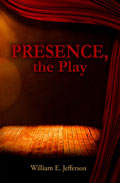
 |
In the town of Port Estillyen, at the end of Lent, the playwright Script is settling into his seat to watch the opening performance of his latest play, Presence, when he hits his head and falls into a coma. In his coma, he enters an in-between land, meeting historical and fantastical figures, such as Melchizedek, Sage, Simon, and a tweeting mockingbird called Mock. Over bonfires, meals, and walks through pastoral meadows, these men convince Script to go through a series of portals and enter Hell to circumvent the devil’s pernicious plans to co-opt his play for evil ends. The quartet must stop Lucifer from ruining both Easter and Estillyen.
The mythical play behind Script’s real play highlights the struggle to enact its subject: being present when threatened by, in the devil’s words, “presence passé.” In the company of caring and attentive new friends, and a beautiful, rejuvenating landscape, Script is reluctant to face a terrifying Hell. Its stench, burning, earthquakes, fear, and other noxious sensations, as well as Lucifer’s speeches about life discarnate in the form of proliferating screens, images, and algorithms (in short, AI replacing I AM’s omnipotence), cause him to collapse multiple times. Hell is indeed depicted as a place where presence is not possible.
As Script’s play and its influences—the Bible, Chaucer, Frost, and Dante—give him the strength not only to enter Hell but to combat it with life-giving action, these sources also add depth and a magical intrigue to the narrative. Reenacted biblical scenes, recitations of ancient texts, and encounters with “Time” enliven the story with otherworldly side dramas. After many passages weighed down with heady discussion and detailed descriptions, in the end, the quartet enacts a plan to squelch Lucifer’s deadly campaign. In a theatrical flourish, the Easter conclusion successfully evokes the hopeful spirit of the holiday.